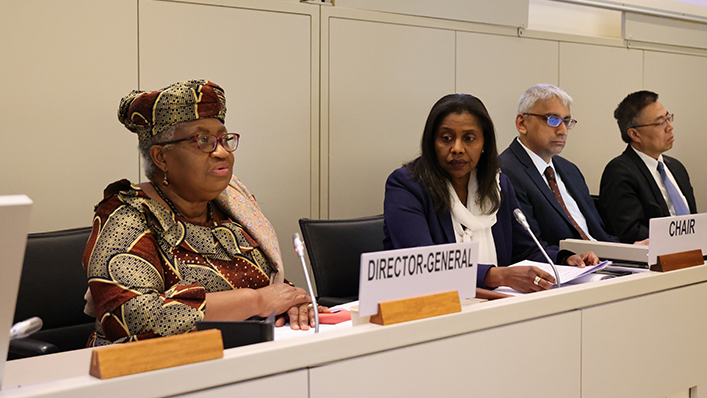
“Special and differential provisions are not ends in themselves: they are a means of enabling and empowering developing countries and LDCs to use the opportunities created by the WTO to improve people’s lives on the ground,” DG Okonjo-Iweala stressed. “A very positive development is that members were able to move in precisely this direction in the two most recent WTO agreements – the Trade Facilitation Agreement and of course the Fisheries Subsidies Agreement. Both allow members to identify the assistance they need – and come with mechanisms to ensure that they get it.”
The main purpose of the meeting was to discuss a new paper by the WTO G90 group of developing countries and LDCs suggesting structured discussions and workshops on ten Agreement-specific proposals that they tabled previously in March 2020. The proposals seek to strengthen existing special and differential provisions and make them more precise, effective and operational so that they may more effectively address development gaps among members. In the MC12 Outcome Document, ministers reaffirmed that the provisions of special and differential treatment for developing countries and LDCs form an integral part of the WTO and its agreements.
The structured discussions would take place in the special session of the Committee on Trade and Development, South Africa noted on behalf of the G90 Group, and would fit into ministers’ post-MC12 instructions to continue improving the application of special and differential treatment. Ministers mandated progress to be reported to the General Council by the 13th Ministerial Conference scheduled to take place in Abu Dhabi in February 2024. Highlighting “how important it is to find a way forward on the G90 proposals”, DG Okonjo-Iweala stressed: “This renewed mandate from ministers is an opportunity – and I urge you to seize it.”
Delegations at the special session recognized the importance of special and differential treatment and of helping developing countries and LDCs fully implement WTO rules and further integrate into the global trading system. They expressed willingness to engage in discussions in the format proposed by the G90. Some delegations indicated that members should look for ways of further tailoring the special and differential provisions to the needs of developing countries.
The WTO’s agreements contain over 150 provisions according developing countries and LDCs flexibilities such as longer implementation timeframes, modulated commitments and access to capacity-building activities.
The Chair of the special session of the Committee on Trade and Development, Ambassador Kadra Ahmed Hassan of Djibouti, expressed satisfaction that members could agree to the process proposed by the G90. She invited members to build on the mandate on special and differential treatment from MC12 as well as on the positive discussions on the development dimension of the WTO reform agenda that took place at an informal General Council meeting in February.
In her concluding remarks, she said she would be in touch with members on the next steps and called on them “to engage in good faith and with an open mind”. Encouraging the special session of the Committee to inspire work on special and differential treatment in other forums, she stressed: “We have a great opportunity to materialize the importance of development in the WTO’s work.”
The negotiations taking place in the special session of the Committee on Trade and Development are mandated by Paragraph 44 of the Doha Ministerial Declaration.
More information on special and differential treatment is available here.
Share
Reach us to explore global export and import deals